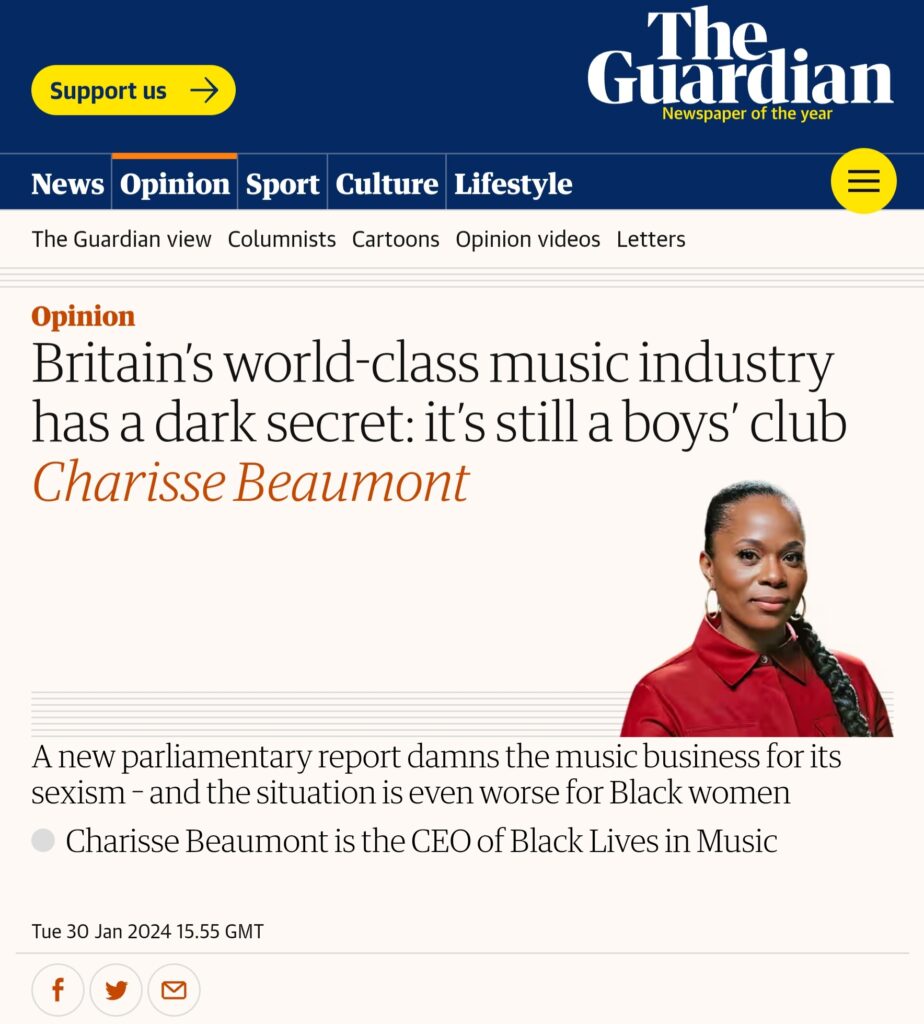Following the launch of Women and Equalities Committee (WEC) report, the issue of misogyny in music has occupied the minds and lips of many this past week; for industry leaders and parliament, the topic has been unavoidable – that’s what activists, campaigners and organisations are hoping. The problem of misogyny said to be ‘endemic’ within the UK music industry was raised by WEC and BLiM in a consultative inquiry. One of the largest of its kind committed to tackling this issue. Today, misogyny in music finds itself solidly in the popular discourse and Dr. Charisse Beaumont, Chief Executive of Black Lives in Music (BLiM) wants to maintain that very momentum.
In a Guardian op-ed penned by the Chief Exec, she expanded on the recommendations made, it’s findings and went on to outline what parts of the sector required immediate correction. For Beaumont, the call for protections, against hostile working environments free from sexism, racism, bullying and harassment, are not just for the common good of those currently working within the sector but for music hopefuls, too. As such, a safer music sector means a more secure pipeline of talent entering the game.
She maintains within the piece that it’s about creating a safer industry where everyone, from all backgrounds, can thrive. “The music industry’s entrenched gatekeeping practices are deeply concerning. Often perceived as forward-thinking, the industry is, in reality, dominated by an exclusive “boys’ club” culture,” Beaumont penned in the article. Going onto mention that, “Such preservation of the status quo effectively bars diverse talents and voices from gaining entry and recognition.”
Several artists and public figures in recent months such as the likes of Rebecca Ferguson, and Annie Mac have also publicly spoken about what they also felt was an exclusionary industry made difficult by a toxic ‘boys club’ culture. Singer Self Esteem spoke herself about whether there were indeed enough women artists at headlining major festivals. “Of course there isn’t,” she said in an interview with NME. “It takes a decade to have a career that means you could headline a festival, and most women quit because it’s such a dreadful environment, it’s an unsafe environment, it’s unregulated.”
Rightfully, Beaumont asks the very urgent question of how we can sustain an industry and bring in fresh, diverse talent when they continue to go unsupported, unheard and exposed to the harshest facets of the music industry. In her view, UK music’s terrain is vastly unregulated. Its not good enough for talent to be expected to sit next to their abusers at award ceremonies – with the work she is doing at Black Lives in Music, she wants to begin challenging this fallacy of ‘endurance’. An expectation that is especially compounded, she explains, for Black and brown musicians who experience an even more layered form of abuse, which until coined by Academic Roxanne Gay in 2010, previously had no name.
Misogynoir, as explained by black feminist scholar, Feminista Jones. “Provides a racialised nuance that mainstream feminism [doesn’t capture]. We are talking about misogyny, yes, but there is a specific misogyny that is aimed at black women and is uniquely detrimental to black women.” For those from Black and brown ethnic backgrounds who responded to the survey and provided testimony, the situation involved added pressure to conform, alter their appearance or even sexualise themselves.
The report emphasises the importance of viewing these issues from a more intersectional framework by looking at the varying challenges faced by all women and non-binary individuals. With increased poor mental health outcomes, low rates of progression and instances of micro-aggressions and outright racism being reported specifically by respondents from Global Majority backgrounds. The situation is dire.
So, how do we tangibly overcome? Several recommendations were made as part of the report from lowering the reporting threshold that companies need to release publicly which shows the makeup of their 50 employees from 100. To pushing for a stronger stance against the use of NDAs and similar confidentiality agreements in instances of sexual abuse, harassment, bullying, or discrimination.
Whichever the right way forward in the coming months, the WEC report is a hopeful first step. Beaumont wants to remind us that in working to achieve change, complacency is not an option. As she states within the opinion essay itself, “We must work together to remove the barriers that have long hindered the progress of women in our industry.”
For those affected by the issues illuminated in the Misogyny in Music report, help is available. Help Musicians provides a dedicated helpline where individuals can confidentially speak to someone about their experiences and challenges within the music industry. The helpline is there to offer assistance, understanding, and guidance to those in need.
Byllying and Harassment Helpline

